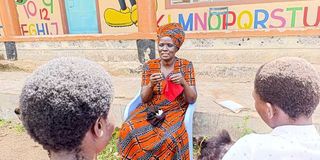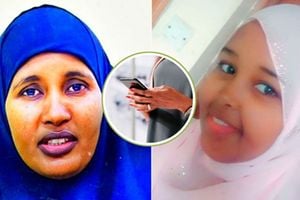Rising from rejection: Inside the initiative giving Bungoma teen mothers a second chance at life

Ms Julian Kimakwa, a trainer at Chwele Vocational Training Centre, during a training session with some of the teenage mothers on October 10, 2024.
What you need to know:
- Statistics paint a sobering picture of Bungoma’s struggle with teen pregnancy.
- According to the KDHS 2022, 18.6 per cent of girls aged 15–19 have experienced pregnancy, making it the county with the highest prevalence in western.
- These young mums dropped out of school and were hopeless until the tailoring training initiative came calling; they now support their families.
The morning sun streams through the dusty windows of a small tailor shop at Chwele Centre, Bungoma County, where the rhythmic hum of sewing machines mingles with the laughter of children playing in the adjacent day-care. The air is thick with the scent of starched fabric and hope. Behind one of these machines sits Peggy*, her fingers deftly guiding a piece of vibrant kitenge through the needle, each stitch representing a step away from a past she never imagined for herself.
At 18, her calloused hands tell a story of interrupted dreams and newfound purpose – much like thousands of other teenage girls in this corner of Western Kenya. The constant whirring of her sewing machine provides a steady backbeat to the bustling sounds of Chwele Centre, where market vendors call out their wares and motorcycles zip past on the dusty roads outside.
Five years ago, Peggy was just another bright-eyed 13-year-old student, excelling in her education at a local primary school in Chwele. The wooden desks and chalk-dusted classrooms of her past seem like a lifetime ago now, though they're barely a stone's throw from her current workplace.
“Everything moved so fast,” Peggy reflects, momentarily pausing her work, her eyes fixed on the colourful fabric before her.
“I was hanging out with boys, and before I knew it, in early 2020, amid the Covid-19 pandemic, I found myself pregnant.”
Her voice carries the weight of choices made in rebellion against a decision that had forced her to repeat Class Six despite being one of the top performers in her class.
Statistics paint a sobering picture of Bungoma’s struggle with teen pregnancy. According to the Kenya Demographic and Health Survey 2022, 18.6 per cent of girls aged 15–19 have experienced pregnancy, making it the county with the highest teen pregnancy rates in western.
More alarming still, county records reveal that between January 2016 and August 2023, 106,982 girls aged 10–19 have been pregnant. In 2023 alone, the county recorded 8,375 teenage pregnancies, with Kabuchai, where Chwele is located, accounting for 871 of these cases.
For Peggy, pregnancy at 15 meant immediate expulsion from both school and home. “My father sent me packing,” she recounts, her fingers nervously smoothing the fabric on her workbench. “He said since I had chosen to take responsibility for a child, his home could no longer host me.”
She found herself moving in with her boyfriend in a single room within Chwele, where the walls seemed to close in during the lonely days when her boyfriend would be summoned home by his disapproving parents. “Sometimes I had to survive only on water when he (boyfriend) was at his parents,” she says, the memory of those hungry days still fresh.
In another corner of the workshop, Rose's* sewing machine creates its own rhythm. Now 20, her story interweaves with Peggy's in the tapestry of Bungoma's teenage motherhood narrative. The firstborn in a family of nine conceived while in Form One in 2020, when the world was grappling with the uncertainty of Covid-19.
The worn-out chairs of her mother's salon, where she once spent her days watching clients come and go, stood witness to her family's gradual unravelling.
“When my father was still alive, we could always turn to him when we needed anything,” Rose says, her voice barely audible above the mechanical symphony of the workshop. “After his death in 2009, my mother was overwhelmed."
She pauses to wipe the sweat from her brow, the heat of the afternoon sun now streaming through the windows. The family fractured like a dropped mirror – five of her sisters scattered to relatives’ homes. Two would later marry after completing Class Eight, driven by physical violence and mistreatment in their new homes.
“My biggest fear is that all my sisters could end up in a similar situation as me,” Rose confides, her eyes following her daughter who plays with other children in the day-care centre.
Anita Khaemba, a resident of Kabuchai, notes how the community's traditional mind-set often becomes another barrier.
“Most locals are not in support of young girls going back to school and would instead prefer to marry them off to the perpetrators,” she explains, her words echoing the frustration of those fighting for change.
But amidst these challenging narratives, a ray of hope emerged in January 2023. The county government, in partnership with Rotary Club of Bungoma Magharibi and White Salmon, launched an innovative programme at Chwele Vocational Training Centre. The initiative, breathing life into the old vocational centre, enrolled 50 girls in two cohorts for nine-month training in 2023 and 2024.
“The programme is designed to promote community development by supporting mothers and their children while fostering sustainable growth,” explains Peter Simiyu, the project's contact person, as he walks through the busy workshop.
Julian Kimakwa, a trainer at the centre, adds that the programme focuses on empowering young mothers, breaking the poverty cycle, and equipping them with essential business skills. The support extends beyond vocational training.
“They provided day-care facilities where our children could be looked after while we studied," Peggy shares, gesturing towards the cheerful sounds coming from the adjacent room.
“Throughout the programme, our children received free healthcare services.”
The graduates received sewing machines, starter kits, and crucial training in business finance. The initiative’s impact is already visible in the community. Rose, who graduated in December 2023, now co-owns a shop with three friends from the training programme.
“In a good month, I can make up to Sh6,000 in profit," she says proudly, her eyes lighting up. “I can support my daughter, who's in nursery school now, help my siblings, and even assist my mother.”
These success stories align with global efforts to support girls, as highlighted by Unicef, UNFPA and UNAids on this year's International Day of the Girl. “Girls around the world tell us they know progress is possible. After all, the world has more than halved child mortality since the 1990s, while 50 million more girls are in school since 2015,” says Etleva Kadili, Eastern and Southern Africa Regional Director for Unicef.
Lydia Zigomo, Eastern and Southern Africa Regional Director for UNFPA, emphasises the ongoing challenge: “On this international day, we call on countries to support laws and policies that enable girls, including those who are mothers, to continue with education, receive respectful sexual and reproductive healthcare, and fully engage in national development.”
For Peggy and Rose, hope takes the shape of concrete plans. Rose dreams of helping her daughter become a doctor – the career she once envisioned for herself. “I can take care of all my needs,” she says, straightening a finished dress on a nearby hanger. "I'm also looking forward to monthly savings to buy land someday and settle my family."
Peggy, meanwhile, aims to expand her business and support other teenage girls who haven't had access to similar training opportunities. As the afternoon sun casts long shadows through the workshop windows, she adjusts her machine for one last seam.
The steady rhythm of her work joins the chorus of other machines, creating a symphony of determination and resilience. In this small workshop in Chwele Centre, these young mothers are crafting not just clothes, but new futures for themselves and their children, one careful stitch at a time.
*Names changed to protect the teenage girls.





